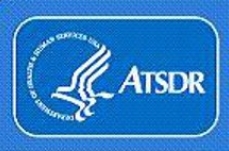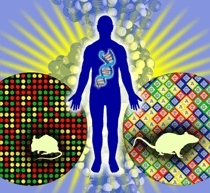Human Health (main)
Human Health
From the physical and social well-being of an individual to the functioning of an ecosystem, health has many different meanings and applications. More than just the absence of disease, health implies a state of well-being. Ever since the origin of life, physical, chemical and biological factors have impacted the health or biological status of living things. And in response life has evolved immune systems, detoxification systems and redundancies to stave off infection, disease, and toxicity. As the world becomes more interconnected, and industrialized, diseases never seen in one part of the globe now threaten to devastate human, wildlife and plant populations, while industrial chemicals now contaminate life in the most remote regions. Maintaining health, whether ecosystem, human or microbial arguably presents one of the greatest challenges of the day.
-
 Featured Article
Featured Article  Respiration (Human Health)Respiration is the gas exchange effected by living organisms for the purpose of sustaining vital metabolic processes. In the case of most animals, oxygen is taken into the... More »
Respiration (Human Health)Respiration is the gas exchange effected by living organisms for the purpose of sustaining vital metabolic processes. In the case of most animals, oxygen is taken into the... More »
-
 Featured Article
Featured Article  Phosphor-Based White LEDs: Mixed Blessings?Light-emitting diodes use less energy and last longer than even compact fluorescent lights.This article, written by Angela Spivey*, appeared first in Environmental Health... More »
Phosphor-Based White LEDs: Mixed Blessings?Light-emitting diodes use less energy and last longer than even compact fluorescent lights.This article, written by Angela Spivey*, appeared first in Environmental Health... More »
-
 Featured Article
Featured Article  Climate Change, Crop Yields, and UndernutritionThis podcast with Sari Kovats of the Department of Social and Environmental Research at the London School of Hygiene and Tropical Medicine was produced by Ashley Ahearn*. It... More »
Climate Change, Crop Yields, and UndernutritionThis podcast with Sari Kovats of the Department of Social and Environmental Research at the London School of Hygiene and Tropical Medicine was produced by Ashley Ahearn*. It... More »
-
 Featured Article
Featured Article  Tetrodotoxin (Human Health)Tetrodotoxin (abbreviated as TTX)is a powerful neurotoxin found in a variety of animals and is responsible for upwards of 50 human fatalities a year. Captain James Cook... More »
Tetrodotoxin (Human Health)Tetrodotoxin (abbreviated as TTX)is a powerful neurotoxin found in a variety of animals and is responsible for upwards of 50 human fatalities a year. Captain James Cook... More »
-
 Featured Article
Featured Article  Agency for Toxic Substances and Disease...Search toxic substances by Chemical Abstracts Service Number (CAS#), substance name, synonym, or tradename. Agency for Toxic Substances and Disease Registry's Toxic Substances... More »
Agency for Toxic Substances and Disease...Search toxic substances by Chemical Abstracts Service Number (CAS#), substance name, synonym, or tradename. Agency for Toxic Substances and Disease Registry's Toxic Substances... More »
-
 Featured Article
Featured Article  Obesogens: Environmental Link to Obesity?Obesity is rising steadily around the world. Convincing evidence suggests that diet and activity level are not the only factors in this trend—chemical... More »
Obesogens: Environmental Link to Obesity?Obesity is rising steadily around the world. Convincing evidence suggests that diet and activity level are not the only factors in this trend—chemical... More »
-
 Featured Article
Featured Article  Botulism and home canningHome canning is an excellent way to preserve garden produce and share it with family and friends, but it can be risky or even deadly if not done correctly and... More »
Botulism and home canningHome canning is an excellent way to preserve garden produce and share it with family and friends, but it can be risky or even deadly if not done correctly and... More »
-
 Featured Article
Featured Article  Estimation of adult human biomassThe energy requirement of species at each trophic level is a function of the number of organisms and their average mass. The study estimates global human biomass, its... More »
Estimation of adult human biomassThe energy requirement of species at each trophic level is a function of the number of organisms and their average mass. The study estimates global human biomass, its... More »
-
 Featured Article
Featured Article  Plastic products and estrogenic chemicalsChemicals that mimic or antagonize the actions of naturally occurring estrogens are defined as having estrogenic activity (EA), which is the most common form of endocrine... More »
Plastic products and estrogenic chemicalsChemicals that mimic or antagonize the actions of naturally occurring estrogens are defined as having estrogenic activity (EA), which is the most common form of endocrine... More »
 Synthetic turf: health debate Last Updated on 2014-11-29 22:02:51 This article, written by Dr. Luz Claudio of Mount Sinai School of Medicine, appeared first in Environmental Health Perspectives—the peer-reviewed, open access journal of the National Institute of Environmental Health Sciences. The article is a verbatim version of the original and is not available for edits or additions by Encyclopedia of Earth editors or authors. Companion articles on the same topic that are editable may exist within the Encyclopedia of Earth. In Little League dugouts, community parks, professional athletic organizations, and international soccer leagues, on college campuses and neighborhood playgrounds, even in residential yards, the question being asked is "grass or plastic?" The debate is over synthetic turf, used to blanket lawns, park spaces, and athletic fields where children and adults relax and play; the questions are whether synthetic turf... More »
Synthetic turf: health debate Last Updated on 2014-11-29 22:02:51 This article, written by Dr. Luz Claudio of Mount Sinai School of Medicine, appeared first in Environmental Health Perspectives—the peer-reviewed, open access journal of the National Institute of Environmental Health Sciences. The article is a verbatim version of the original and is not available for edits or additions by Encyclopedia of Earth editors or authors. Companion articles on the same topic that are editable may exist within the Encyclopedia of Earth. In Little League dugouts, community parks, professional athletic organizations, and international soccer leagues, on college campuses and neighborhood playgrounds, even in residential yards, the question being asked is "grass or plastic?" The debate is over synthetic turf, used to blanket lawns, park spaces, and athletic fields where children and adults relax and play; the questions are whether synthetic turf... More »  Oil Drilling Environmental Health Concerns Last Updated on 2014-11-29 21:42:39 This article, written by Charles W. Schmidt1, appeared first in Environmental Health Perspectives—the peer-reviewed, open access journal of the National Institute of Environmental Health Sciences The article is a verbatim version of the original and is not available for edits or additions by Encyclopedia of Earth editors or authors. Companion articles on the same topic that are editable may exist within the Encyclopedia of Earth. As Royal Dutch Shell and other oil companies prepare to drill offshore in the Alaskan Outer Continental Shelf (OCS), a new report commissioned by the Washington, DC–based Pew Environment Group concludes current response capabilities aren’t adequate to contain and clean up a major spill in the area.1 Marilyn Heiman, who directs the group’s U.S. Arctic program, says drilling on the Alaskan OCS requires a science-based... More »
Oil Drilling Environmental Health Concerns Last Updated on 2014-11-29 21:42:39 This article, written by Charles W. Schmidt1, appeared first in Environmental Health Perspectives—the peer-reviewed, open access journal of the National Institute of Environmental Health Sciences The article is a verbatim version of the original and is not available for edits or additions by Encyclopedia of Earth editors or authors. Companion articles on the same topic that are editable may exist within the Encyclopedia of Earth. As Royal Dutch Shell and other oil companies prepare to drill offshore in the Alaskan Outer Continental Shelf (OCS), a new report commissioned by the Washington, DC–based Pew Environment Group concludes current response capabilities aren’t adequate to contain and clean up a major spill in the area.1 Marilyn Heiman, who directs the group’s U.S. Arctic program, says drilling on the Alaskan OCS requires a science-based... More »  Gut reaction: environmental effects on the human microbiota Last Updated on 2014-11-29 21:03:07 This article, written by Melissa Lee Phillips, appeared first in Environmental Health Perspectives—the peer-reviewed, open access journal of the National Institute of Environmental Health Sciences. The article is a verbatim version of the original and is not available for edits or additions by Encyclopedia of Earth editors or authors. Companion articles on the same topic that are editable may exist within the Encyclopedia of Earth. Living with each of us—on our skin, in our mucosa, and in our gastrointestinal (GI) tract—are microorganisms whose numbers dwarf the number of our own cells and genes. Although some of these microbes are pathogens, most are harmless or even beneficial. The body’s assortment of microorganisms, collectively called the microbiota, is similar to an organ in that it performs functions essential for our survival. Some microbes produce... More »
Gut reaction: environmental effects on the human microbiota Last Updated on 2014-11-29 21:03:07 This article, written by Melissa Lee Phillips, appeared first in Environmental Health Perspectives—the peer-reviewed, open access journal of the National Institute of Environmental Health Sciences. The article is a verbatim version of the original and is not available for edits or additions by Encyclopedia of Earth editors or authors. Companion articles on the same topic that are editable may exist within the Encyclopedia of Earth. Living with each of us—on our skin, in our mucosa, and in our gastrointestinal (GI) tract—are microorganisms whose numbers dwarf the number of our own cells and genes. Although some of these microbes are pathogens, most are harmless or even beneficial. The body’s assortment of microorganisms, collectively called the microbiota, is similar to an organ in that it performs functions essential for our survival. Some microbes produce... More »  Water pollution (Human Health) Last Updated on 2014-11-17 12:18:45 Water pollution is the contamination of natural water bodies by chemical, physical, radioactive or pathogenic microbial substances. Adverse alteration of water quality presently produces large scale illness and deaths, accounting for approximately 50 million deaths per year worldwide, most of these deaths occurring in Africa and Asia. In China, for example, about 75 percent of the population (or 1.1 billion people) are without access to unpolluted drinking water, according to China's own standards.[1] Widespread consequences of water pollution upon ecosystems include species mortality, biodiversity reduction and loss of ecosystem services. Some consider that water pollution may occur from natural causes such as sedimentation from severe rainfall events; however, natural causes, including volcanic eruptions and algae blooms from natural causes constitute a minute amount of the... More »
Water pollution (Human Health) Last Updated on 2014-11-17 12:18:45 Water pollution is the contamination of natural water bodies by chemical, physical, radioactive or pathogenic microbial substances. Adverse alteration of water quality presently produces large scale illness and deaths, accounting for approximately 50 million deaths per year worldwide, most of these deaths occurring in Africa and Asia. In China, for example, about 75 percent of the population (or 1.1 billion people) are without access to unpolluted drinking water, according to China's own standards.[1] Widespread consequences of water pollution upon ecosystems include species mortality, biodiversity reduction and loss of ecosystem services. Some consider that water pollution may occur from natural causes such as sedimentation from severe rainfall events; however, natural causes, including volcanic eruptions and algae blooms from natural causes constitute a minute amount of the... More »  Ecosystems and Human Well-Being: Volume 1: Current State and Trends: Air Quality and Climate Last Updated on 2014-11-17 12:15:25 This is Chapter 13 of the Millenium Ecosystem Assessment report Ecosystems and Human Well-Being: Volume 1: Current State and Trends Coordinating Lead Authors: Jo House, Victor Brovkin Lead Authors: Richard Betts, Bob Constanza, Maria Assunçao Silva Dias, Beth Holland, Corinne Le Quéré, Nophea Kim Phat, Ulf Riebesell, Mary Scholes Contributing Authors: Almut Arneth, Damian Barratt, Ken Cassman, Torben Christensen, Sarah Cornell, Jon Foley, Laurens Ganzeveld, Thomas Hickler, Sander Houweling, Marko Scholze, Fortunat Joos, Karen Kohfeld, Manfredi Manizza, Denis Ojima, I. Colin Prentice, Crystal Schaaf, Ben Smith, Ina Tegen, Kirsten Thonicke, Nicola Warwick Review Editors: Pavel Kabat, Shuzo Nishioka Main Messages Ecosystems, both natural and managed, exert a strong influence on climate and air quality. Ecosystems are both sources and sinks of greenhouse gases,... More »
Ecosystems and Human Well-Being: Volume 1: Current State and Trends: Air Quality and Climate Last Updated on 2014-11-17 12:15:25 This is Chapter 13 of the Millenium Ecosystem Assessment report Ecosystems and Human Well-Being: Volume 1: Current State and Trends Coordinating Lead Authors: Jo House, Victor Brovkin Lead Authors: Richard Betts, Bob Constanza, Maria Assunçao Silva Dias, Beth Holland, Corinne Le Quéré, Nophea Kim Phat, Ulf Riebesell, Mary Scholes Contributing Authors: Almut Arneth, Damian Barratt, Ken Cassman, Torben Christensen, Sarah Cornell, Jon Foley, Laurens Ganzeveld, Thomas Hickler, Sander Houweling, Marko Scholze, Fortunat Joos, Karen Kohfeld, Manfredi Manizza, Denis Ojima, I. Colin Prentice, Crystal Schaaf, Ben Smith, Ina Tegen, Kirsten Thonicke, Nicola Warwick Review Editors: Pavel Kabat, Shuzo Nishioka Main Messages Ecosystems, both natural and managed, exert a strong influence on climate and air quality. Ecosystems are both sources and sinks of greenhouse gases,... More » 